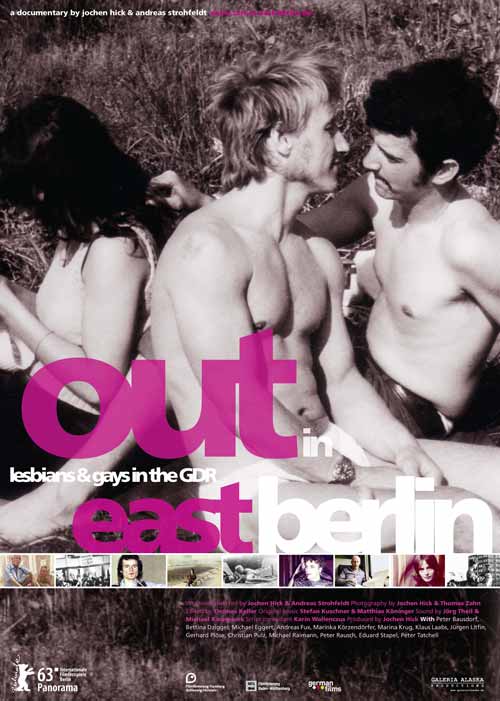|
For fact sheet PDF click here. OUT IN EAST BERLIN SYNOPSIS (English) - SYNOPSIS French, Spanish & Italian here! 1. 2. Contrairement à la RFA, l’homosexualité n’était déjà plus considérée comme un crime dans le Code pénal de la RDA en 1968. Toutefois, la population n'a pas vraiment accueilli à bras ouverts ses concitoyens homosexuels; la sexualité de ces derniers demeurait taboue et ils étaient souvent marginalisés. Ceux d'entre eux qui avaient vécu la guerre et essayaient à présent de mener une vie normale et discrète se sont sentis menacés par les jeunes homosexuels qui s’affichaient ouvertement et réclamaient des espaces d'expression. Treize biographies émouvantes retracent les événements politiques et privés ayant mené à un lutte contre les institutions publiques. Synopsis Spanish A pesar de que en la República Federal, allá por 1968, ya no estaba penalizaba la homosexualidad por el código penal de la República Democrática Alemana, el estado de los trabajadores y de los agricultores no acogía con los brazos abiertos a la población gay y lesbiana; su sexualidad era tabú y a menudo se les marginaba de la vida pública. Los hombres y las mujeres homosexuales que habían visto la guerra e intentaban ahora vivir sus vidas con total normalidad se sentían amenazados por los homosexuales más jóvenes que salían a la luz y exigían un lugar donde expresarse. Trece biografías conmovedoras son un testimonio de los acontecimientos privados y políticos que desembocaron en muestras de oposición contra del aparato del estado. Synopsis Italian Diversamente della Repubblica federale, la Repubblica democratica
tedesca nel 1968 non considerava più l'omosessualità
come un crimine. Tuttavia, la popolazione non accoglieva i cittadini
gay e lesbiche con le braccia aperte: la loro sessualità
era un tabù e spesso venivano emarginati dalla vita pubblica.
La generazione di uomini e donne omosessuali che aveva vissuto la
guerra e che all’epoca cercavano di vivere una vita di discreta
normalità, si sentiva minacciata dai giovani omosessuali
che facevano coming out pretendendo spazi in cui esprimersi. Tredici
commoventi biografie raffigurano gli |
Privacy Policy ©2002-2018 Galeria-Alaska - All Rights Reserved.
Looking to one single frame only? Then please click here for homepage/first page.
Site by Woolythinkers.
